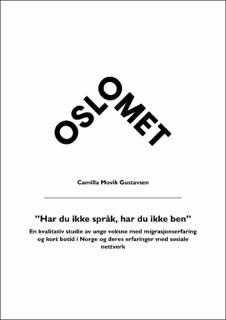”Har du ikke språk, har du ikke ben”: En kvalitativ studie av unge voksne med migrasjonserfaring og kort botid i Norge og deres erfaringer med sosiale nettverk
Master thesis
Published version
Permanent lenke
https://hdl.handle.net/11250/3096988Utgivelsesdato
2023Metadata
Vis full innførselSamlinger
Sammendrag
Denne masteroppgaven utforsker betydningen av sosiale nettverk hos unge med migrasjonserfaring og kort botid i Norge. Problemstillingen «Hvordan beskriver unge med migrasjonserfaring og kort botid i Norge betydningen av sosiale nettverk?», har til hensikt å gi en bedre forståelse av hvordan informantene etablerer og opprettholder sosiale nettverk, hvordan de sosiale relasjonene ser ut og hva slags utfordring som kan oppstå i etableringen av sosiale nettverk. Det er benyttet kvalitative, semistrukturerte intervjuer som metode. Informantene leverte også en fortelling i forkant av forskningsintervjuene. Utvalget bestod av fem informanter, rekruttert gjennom mitt faglige nettverk, videre benyttet jeg tematisk analyse. Studiens teoretiske utgangspunkt er nettverksbegrepet, «personen i situasjonen», Bronfenbrenners sosialøkologiske utviklingsmodell, Bourdieus kapitalbegreper, og resiliens.
Funnene viser til ulike arenaer der informantene etablerer og opprettholder sosiale relasjoner. Samtidig består de uformelle sosiale nettverkene i hovedsak av andre med minoritetsbakgrunn, som de har møtt i velkomstklasser eller norskkurs. Informantene beskriver en varmere kultur i hjemlandet, til forskjell fra Norge, samtidig pekes det på forskjeller i storbyer og mindre steder i Norge. Sosiale nettverk opprettholdes gjennom sosiale medier og felles interesser. De fleste av informantene har opplevd økologiske overganger eller tap som krig, flukt, eller dødsfall. Det er variasjoner i hvordan det sosiale nettverket ser ut, men familie, venner, naboer, Gud og personer i offentlig tjeneste løftes ofte frem. Studien viser til faktorer som påvirker etablering og opprettholdelse av nettverk som språk, kulturforskjeller, sosiale medier, personlig endring og geografisk avstand. Funnene diskuteres og tyder blant annet på at informantene er avhengig av sosial kapital for tilgang til arenaer for å etablere sosiale nettverk. Det vises også til utfordringer med relasjoner til norske jevnaldrende, der forholdet individ og samfunn også diskuteres. This master's thesis explores the significance of social networks among young people with migration experience and a short period of residency in Norway. The research question, "How do young people with migration experience and short residency in Norway describe the significance of social networks?" aims to provide a better understanding of how the informants establish and maintain social networks, what these social relationships look like, and what challenges may arise in the establishment of social networks. Qualitative, semi-structured interviews were conducted with an interview guide as the method. Informants also submitted a story prior to the research interviews. The sample consisted of five informants recruited through my professional network, and thematic analysis was used. The theoretical framework of the study is the concept of networks, "the person in the situation," Bronfenbrenner's social ecological development model, Bourdieu's capital concepts, and resilience.
The findings indicate different arenas in which informants establish and maintain social relationships. However, informal social networks primarily consist of other people with minority backgrounds whom they have met in welcome classes or Norwegian language courses. The informants describe a warmer culture in their home country compared to Norway, while differences between urban and rural areas in Norway are also highlighted. Social networks are maintained through social media and common interests. Most of the informants have experienced ecological transitions or losses such as war, flight, or death. There are variations in what social networks look like, but family, friends, neighbors, God, and people in public services are often mentioned. The study highlights factors that affect the establishment and maintenance of networks, such as language, cultural differences, social media, personal change, and geographical distance. The findings are discussed and suggest, among other things, that the informants depend on social capital to access arenas for establishing social networks. Challenges with relationships to Norwegian peers are also discussed, where the relationship between the individual and society is also considered.
